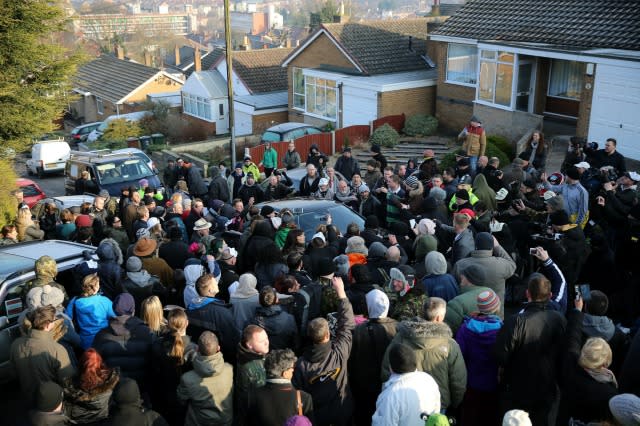Cancer survivor evicted from his home: protesters and police clash

Tom Crawford has been fighting to stay in his home for the past eight years. This week, despite hundreds of protestors trying to stop bailiffs entering his bungalow in Carlton, Nottinghamshire, the 64-year-old cancer survivor was removed.
Crawford had taken out a mortgage with Bradford and Bingley in 1988. He and his wife thought they had paid it off, but when the deal came to an end, they were told that there was £43,000 still outstanding - because instead of a repayment mortgage they had an interest-only deal.

The couple felt that the mortgage company had made a mistake, and decided to fight them through the courts. A judge found against them, and ordered them to pay. Since then, the debt collectors have made a number of attempts to repossess the house.
The first was just after Crawford was diagnosed with cancer, and he was on his sick bed at the time. They threatened to come back in June last year, so he posted a plea on YouTube asking for people to come and stand 'shoulder to shoulder' with him to prevent the eviction. As we reported at the time, his plea drew 200 protestors, and the bailiffs turned back before they reached the house.

This week, a final appeal was rejected, and the bailiffs returned. This time there was a heavy police presence, and they set up a cordon and a road block, to enable the bailiffs to evict Crawford. Tensions were running high and tempers flared.
Police told The Nottingham Post on Thursday night that five people had been arrested - two on suspicion of assault on a police constable, one for a breach of the peace, one on suspicion of a racially aggravated public order offence and the other on suspicion of assaulting a police officer and a breach of the peace.

UK Asset Resolution Limited, the holding company acting on behalf of Bradford and Bingley told the Daily Mail: "The Crawfords have been evicted from the property. Bailiffs were present at the property to enforce the possession order granted by the court. Repossession is always viewed as a last resort and follows a series of forbearance options, with the aim of finding a solution that takes account of the customer's specific circumstances."
"Regrettably, in this instance, we have been unable to find a solution. The court has ruled that the Crawfords' appeal did not have any prospects of success. Bradford and Bingley has followed proper legal procedure and we have an enforceable possession order for the property.'
Your rights
In an ideal world, you'll never face the threat of bailiffs coming to your home. However, given how unpredictable life can be for you and your loved ones, it's important to know what you can do if this happens.
Bailiffs may visit your property if you haven't paid any number of different sorts of debts. They have to give you seven days' notice, so the best way to avoid a visit is to act when you get this notice - at the very latest. That way you can arrange to pay your debts without them coming anywhere near your home.
If things get to the stage where they come to your property, they are not allowed to visit after 9pm or before 6am, and they cannot enter by force. The exception to this final point is if you have unpaid criminal fines, income tax or stamp duty - in which case they are allowed to force their way into your home.
If you don't let the bailiffs in, they have the power to take away things outside your home - including your car. They will also add the cost of the visit to the total you owe, and the debts will continue to mount.
If you do let them in, you can arrange to pay them. It doesn't all have to be paid immediately, so you can offer to pay in installments. Unfortunately they don't have to accept your offer.
If you cannot pay them, they have the right to take some of your belongings, and sell them to pay your debts and cover their fees. They can take luxuries like the TV or a games console, but cannot take the things you need to live like your clothes, cooker or fridge. They can't take someone else's belongings either, or tools you need for work (unless they are worth more than £1,350).
It's worth noting that they will get a tiny fraction of what your belongings are worth to you, so this should be a last resort. If you owe money and you cannot pay, the sooner you address the problem, and get help, the better, because if things end up in the hands of the bailiffs it can be incredibly stressful and expensive.
Debt stories on AOL Money
Mortgage lenders woo older borrowers
Equity release figures show debt crisis among retired
Missing a bill could cost you your job - or your home





